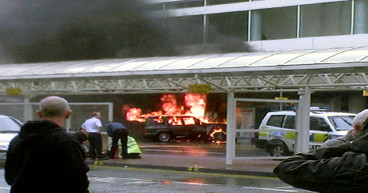0R15 9173.0 0.0% 0R1E 8151.0 0.0% 0M69 20225.0 60.6434% 0R2V 226.5 0.6667% 0QYR 1444.5 1.404% 0QYP 425.0 0.0% 0RUK None None% 0RYA 1530.0 -2.8571% 0RIH 179.7 0.0% 0RIH 175.1 -2.5598% 0R1O 212.5 9900.0% 0R1O None None% 0QFP None None% 0M2Z 250.6141 0.2757% 0VSO 33.18 -6.8108% 0R1I None None% 0QZI 587.0 0.0% 0QZ0 220.0 0.0% 0NZF None None% 0YXG 172.4228 -1.6245%
World news
Scottish Government was concerned for NHS workers after airport attack

Image Source: PAMEDIA
Scottish ministers were concerned about NHS staff being “victimised as a group” after the Glasgow Airport attack, new papers show.
The attack on June 30 2007, where two men rammed a car filled with propane tanks into the doors of the airport, resulted in the death of one of the attackers and injuries to five people.
One of the terrorists, Bilal Abdullah, was working as a doctor at the Royal Alexandra Hospital in Paisley as a diabetes specialist when the attack was committed.
A number of members of the public who witnessed the attack stepped in to aid police in apprehending Abdullah and his accomplice Kafeel Ahmed – who would later die from injuries sustained in the attack.
Both men were also linked to car bombs discovered in London the previous day, with Abdullah eventually convicted of conspiracy to murder and sentenced to life in prison with an order to serve at least 32 years.
A number of other suspects were also linked to the health service, although they were not convicted of involvement.
Papers released by National Records of Scotland from cabinet meetings at the time show concerns raised by ministers over the potential demonisation of NHS staff as a result of the attack and Abdullah’s links to the health service.
Papers of the cabinet meeting held on July 3 2007 show ministers discussed background checks for healthcare workers coming in from abroad – although Abdullah was born in England and qualified as a doctor in Iraq.
The ministers – led by then first minister Alex Salmond in the first months of his tenure – also spoke of potential impacts on the health service of the attack.
“Second, was the need to avoid healthcare workers in any way being victimised as a group because of the connection to the profession of the individuals detained in association with these incidents,” the papers said of a discussion between the cabinet.
“It would be important to get the strong messages across publicly that NHS staff, like the other emergency services involved in these incidents, had shown huge professionalism in dealing with the aftermath of the events and that health professionals from overseas played an important role in the NHS in Scotland.”
Updating ministers about the potential impact on ethnic minority communities more widely, then solicitor general Frank Mulholland KC said the police were “working closely with minority communities who might feel vulnerable and offering the reassurance that any incidents of a racial nature would be rigorously pursued,” the papers said.
Mr Mulholland also told ministers “procurators fiscal would be treating any incidents very seriously but, so far, signs were positive, with only a few isolated cases”.